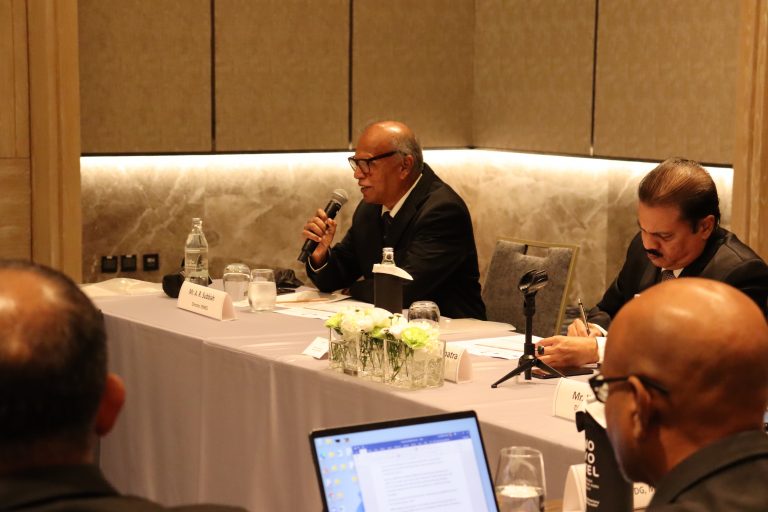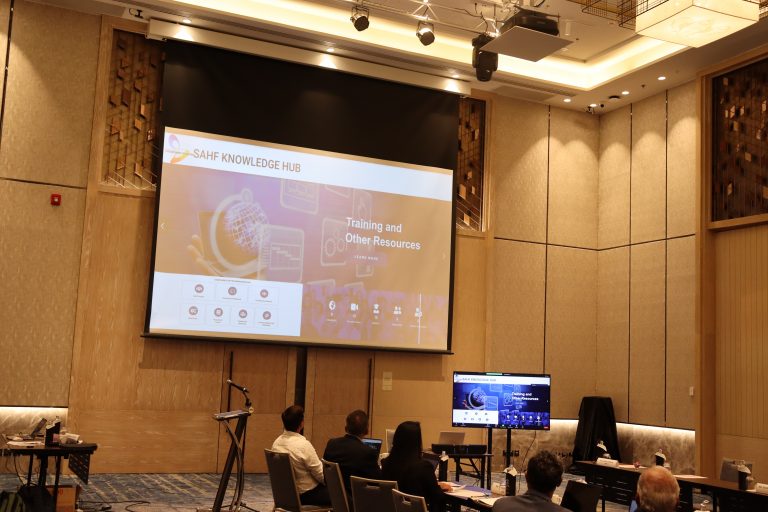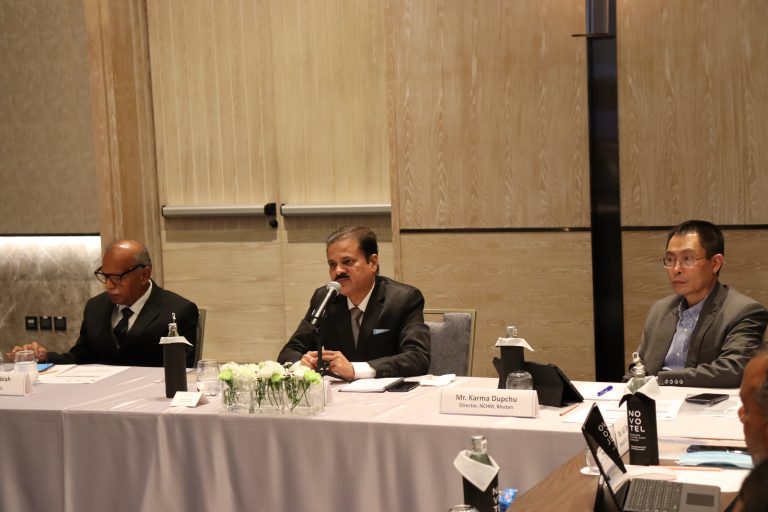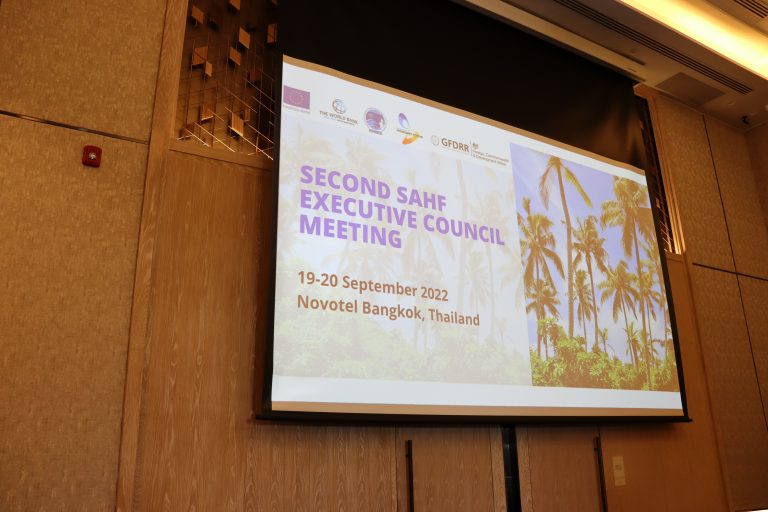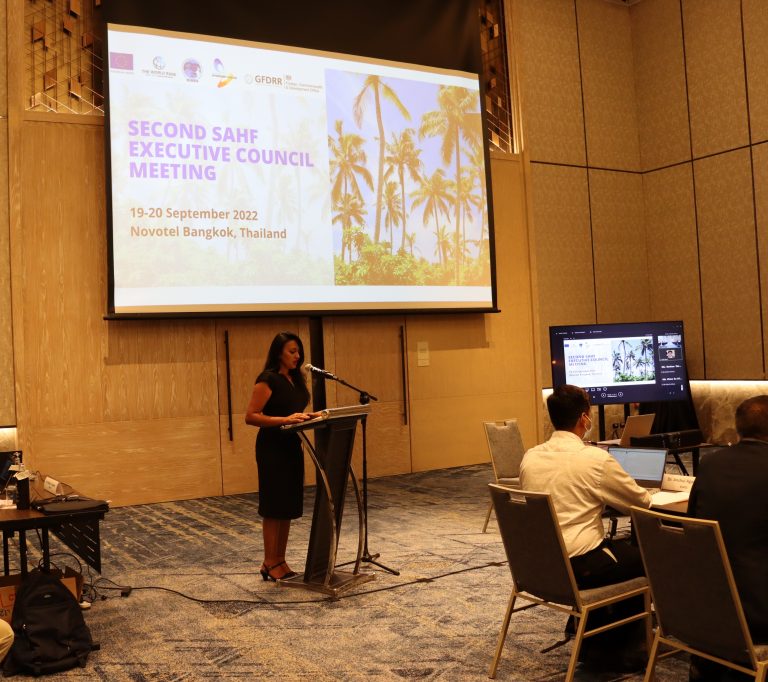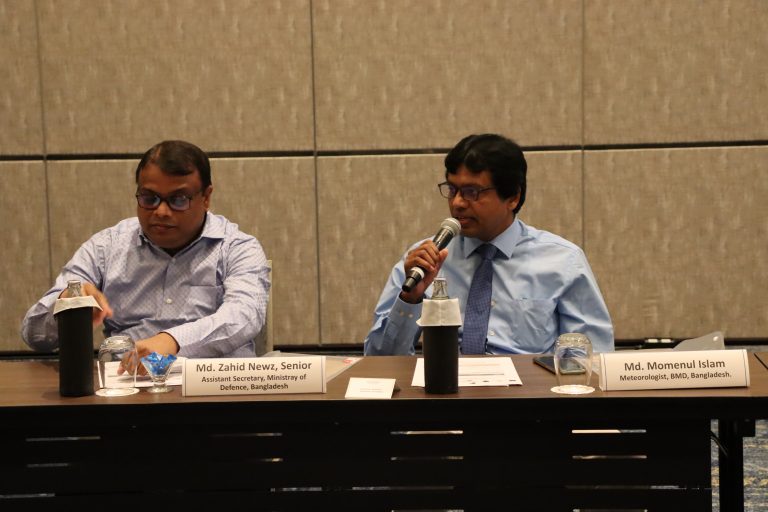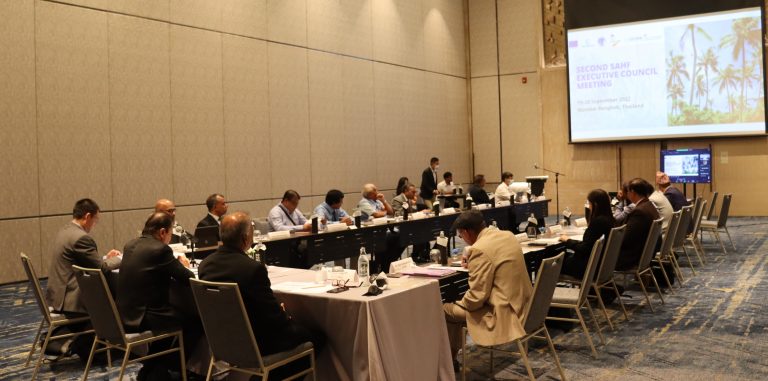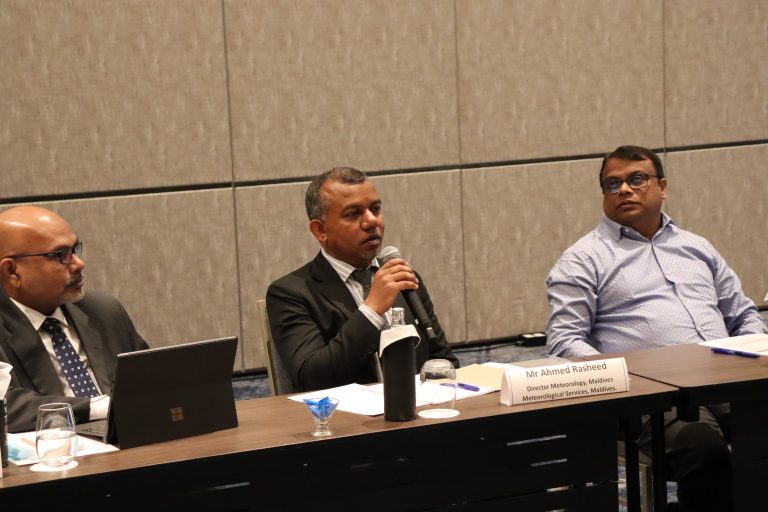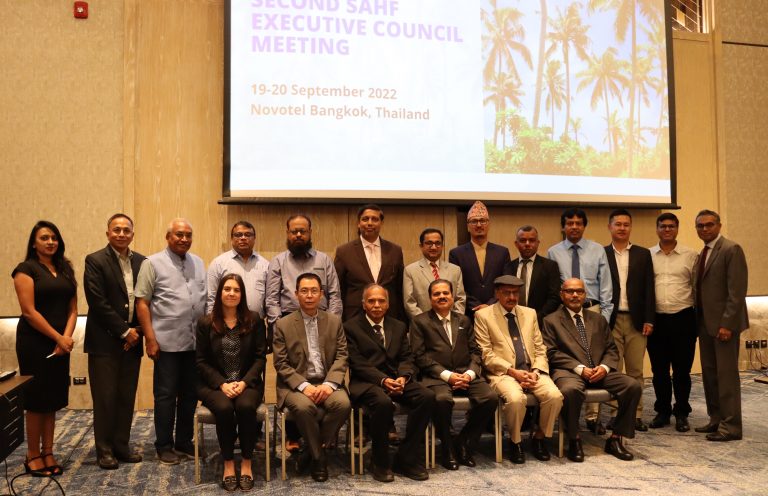
Second Session of the SAHF Executive Council (EC)
Novotel Bangkok Future Park Rangsit, Thailand
19-20 September 2022

- About the Event
- Agenda
- Participants List
- PHOTOS
About The Event
Background/ Context:
The SAHF serves as a platform for regional exchange, collaboration and fostering innovation1. The forum propels the ongoing national and regional modernization efforts in hydromet service delivery to the next level by strengthening technical, human, and institutional capacity. SAHF aims to improve coverage, quality, and access to hydromet service delivery with a focus on sustaining the forum in the South Asia (SA) region. At the second South Asia Hydromet Forum (SAHF II) held in Kathmandu, Nepal in November 2019, the Heads of the National Meteorological and Hydrological Services (NHMSs) in SA agreed to proceed with the implementation of a regional strategy for operational cooperation. Further, it was agreed that Regional Integrated Multi-Hazard Early Warning System for Africa and Asia (RIMES), should develop and implement this activity on behalf of its members in SA. SAHF countries include Afghanistan, Bangladesh, Bhutan, India, Maldives, Myanmar, Nepal, Pakistan, and Sri Lanka, which are members of the RIMES Council. The SAHF process is organized through –
- Annual SAHF sessions – covering all aspects of the forum and with a representation from a wide group of stakeholders connected to operational hydromet services delivery.
- SAHF Executive Council (EC) constituted by DG/Directors of NMHSs forming a managerial council that develops strategic plans for implementation of the SAHF program to support SA regional development in operational forecasting and service delivery.
- Thematic Working Groups (WGs) constituted by nominated experts from countries (involvement through NMHSs and other implementing agencies). The WGs assess capacity needs and build synergy for regional benefits in the four SAHF thematic areas.
At RIMES council meetings in 2020, the Members of the council endorsed to reinforce national activities leading to a more sustainable program for development of meteorological and hydrological services throughout the SA region. They agreed to establish an executive body to provide strategic direction and steer the SAHF process of developing solutions for meteorological and hydrological challenges that are unique to the region. In April 2021, the SAHF Executive Council was established to sustain and promote the SAHF process. The SAHF EC is a decision-making body comprising of Heads of National Meteorological and Hydrological Services (NMHSs) (Director Generals/Directors) of Afghanistan, Bangladesh, Bhutan, India, Maldives, Myanmar, Nepal, Pakistan, and Sri Lanka.
The first EC meeting/ inception meeting was held on 01 April 2021 virtually. Representatives of NMHSs from Bhutan, India, Maldives, Nepal, Pakistan, and Sri Lanka were present during the meeting and provided consent to the constitution of the EC. During the meeting, the council established the four SAHF WGs- Impact-based Forecasting (IBF), Numerical Weather Prediction (NWP), Observational Networks (OBN) and Capacity Enhancement (CE), along with their respective roles and responsibilities. The EC identified key actions for the forum including development of training modules relevant to the region and linkages with other emerging regional professional bodies to strengthen SAHF process. Since inception, the EC has been an integral part of all SAHF activities through its continued guidance and support. The EC continues to steer the implementation of SAHF activities in the region. The key roles of the EC are to:
- Oversee the formation and functioning of SAHF WGs.
- Guide SAHF to identify specific fit-for-purpose investments to build technical and intellectual capacity of NMHSs to respond to the main users’ needs using the skills that exist in the region and globally.
- Provide recommendations for strengthening key elements of the hydromet service value chain.
- Evolve collaborative regional strategies to increase the use of ensemble prediction, impact-based forecasting techniques and user-oriented advisory services.
SAHF Progress Points:
- During 2021-22, the SAHF Working Papers on the four thematic areas (IBF, NWP, OBN & CE) and the Regional Approach paper have been formulated through individual country consultations and WG discussions. The regional approach and Working Papers largely focus on the existing capacities, gaps and needs in the hydromet service delivery of the region. Plans for the SAHF communication mechanism (internal) and the technical design document for the SAHF Knowledge Hub have been developed to facilitate the sustained implementation of SAHF activities.
- The SAHF Knowledge Hub has been developed as a collaborative web-based platform for NMHSs to interact with each other and collectively contribute to the region.
- Continuing the Forum’s sessions held annually, since 2018, the SAHF- III was held online from 15-18 November 2021 bringing together a wide range of public, academic and private institutions to strengthen key elements of the hydromet services value chain. The conference brought together a wide range of user and stakeholder institutions that connect NMHSs with the societal systems, climate sensitive sectors of the economy, academic and private institutions.
- The SAHF Forecasters’ Forum was initiated in February 2022 with the vision to leverage regional knowledge sharing to improve operational forecasting and service delivery.
After its inception, this will be the EC’s first in-person meeting convened to review progress, agree on strategies and actions identified in the SAHF Regional Approach, establish a mechanism to sustain SAHF beyond the current phase, and decide on the way forward. The main objectives of the Second EC Meeting are as follows:
- Review the progress of SAHF activities within the global context of service delivery, challenges encountered, opportunities identified and suggest a way forward.
- Consider the key strategies outlined in the SAHF Regional Approach and suggest both management and technical actions for the implementation.
- Prioritize recommendations for SAHF countries, to be achieved either at national and/or regional level.
- SAHF way forward: discussion on the requirements (financial and technical) to sustain SAHF agenda beyond the current phase.
- Reorient hydromet service delivery in the SA region to meet the challenges of the changing climate regime and growing demands.
- Enhance the role of EC and contributions from the WGs in cooperation and collaboration under the SAHF umbrella.
SAHF- EC Meeting Agenda
| DAY 1 (19 September 2022) | |||
|---|---|---|---|
| Time (Bangkok,(UTC+7) | Programme | Duration (min) | Speaker/Presenter |
| 10:00 -10:10 | Welcome remarks | 10 | Director, RIMES |
| 10:10-10:20 | World Bank | 10 | Ms. Arati Belle, Sr. Disaster Risk Management Specialist |
| 10:20-10:30 | Opening Remarks: Chair of SAHF EC | 10 | Dr. M. Mohapatra, DG, IMD, India |
| 10:30 -10:40 | Opening Remarks: Co-chair SAHF EC | 10 | Mr. Karma Dupchu, Director, NCHM, Bhutan |
| 10:40-10:45 | Adoption of the agenda | 5 | Led by Chair & Co-chair |
| 10:45-11:00 | Introduction of participants | 15 | All participants |
| Group Photo and Tea Break (11:00-11:30) | |||
| 2. SAHF PROGRESS (11:30-12:45) | |||
| The session will highlight the progress and ongoing activities of SAHF, challenges and opportunities for moving SAHF programme forward. | |||
| 11:30-11:45 | SAHF progress and activities in 2021 and 2022 including challenges, opportunities, and way forward | 15 | Dr. G Srinivasan, RIMES |
| 11:45 -12:45 | Review of progress [comments from the EC and WG members on the SAHF progress and impacts] | 60 | EC and WG members |
| Lunch (12:45-13:45) | |||
| 3. THE CHANGING LANDSCAPE OF HYDROMET SERVICE DELIVERY IN SA REGION (13:45-14:35) | |||
| The session will take stock of ongoing activities/projects/programmes and contributions to regional hydromet service delivery by the World Bank, RIMES, and other development partners from 2015 to 2022. | |||
| 13:45-13:55 | Ongoing initiatives of RIMES | 10 | Dr. Itesh Dash & Dr. Anshul Agarwal, RIMES |
| 13:55-14:30 | Intervention-Countries [Countries to share brief points of their ongoing hydro service delivery initiative and contributions to SA region] • Afghanistan (Mr. Mohammad Nasim Muradi, Director, AMD) • Bangladesh • Bhutan • India • Maldives (Mr. Ali Shareef, Deputy DG, MMS) • Myanmar • Nepal (Dr. Rajan Bhattarai, Deputy DG, DHM) • Pakistan (Mr. Mahr Sahibzad Khan, DG, PMD) • Sri Lanka | ||
| 14:30-15:00 | Discussion | 30 | |
| Tea Break (15:00-15:30) | |||
| 4. SAHF REGIONAL APPROACH TO STRENGTHEN HYDROMET SERVICE VALUE CHAIN | |||
| The session will discuss the output of the SAHF WG members and endorsement. | |||
| 15:30-16:10 | Outcome of the SAHF WGs | ||
| Capacity Enhancement (CE) | 10 | Dr. Somnath Dutta (IMD, India) Co-chair, CE WG | |
| Impact-based Forecasting (IBF) | 10 | Dr. Shiromani Jayawardane (DoM, Sri Lanka) Co-chair, IBF WG | |
| Numerical Weather Prediction (NWP) | 10 | Mr. Ahmed Rasheed (MMS, Maldives) Co-chair, NWP WG | |
| Observational Networks (ON) | 10 | Mr. Asif Hussain (PMD, Pakistan) Co-chair, ON WG | |
| 16:10-16:20 | Summary of SAHF Regional Approach | 10 | Dr. K. J. Ramesh, RIMES |
| 16:20-16:30 | Plan for Communication Mechanism | 10 | Mr. Tshencho Dorji, RIMES |
| 16:30-17:15 | Endorsement of Regional Approach initiatives and Working Group targets and activities. (Discussion to be led by EC Chairs) | 45 | EC and WG members |
| DAY 2 (20 September 2022) | |||
|---|---|---|---|
| Time (Bangkok) (UTC+7) | Programme | Duration (min) | Speaker/Presenter |
| 5. LAUNCH OF SAHF KNOWLEDGE HUB (10:00-11:15) | |||
| The session will introduce the SAHF Knowledge Hub and demonstrate the various components of the Knowledge hub including its formal launch. | |||
| 10:00- 10:10 | Introduction of SAHF Knowledge Hub | 10 | Ms. Kousalya V Kumar, RIMES |
| 10:10-10:15 | Formal launch of the SAHF Knowledge Hub | 5 | EC Chair and Co-Chair |
| 10:15-10:55 | Demonstration and discussion of the Knowledge Hub | 45 | Dr. Itesh Dash & team, RIMES |
| 10:55-11:00 | Introduction to the SAHF Podcast Series | 5 | Dr. David Rogers, World Bank |
| Tea Break (11:00-11:30) | |||
| 6. ACTIVITIES AND INITIATIVES OF DEVELOPMENT PARTNERS (11:30-12:30) | |||
| The session will discuss the ongoing activities/projects and initiatives of the development partners in the region | |||
| • BIMSTEC activities [Dr.Ashis K. Mitra, NCMRWF] • ARRCC- Activities for SA under ARRCC and future initiatives [Mr. David Corbelli] • FCDO [Ms. Archana Shukla] • USAID [Dr. Michael Ernst] • UNESCAP [Dr. Sanjay Srivastava and Ms. Temily Baker] | |||
| Lunch (12:30-13:30) | |||
| 7. EVOLUTION OF THE HYDROMET SERVICES IN THE REGION AT THE NATIONAL AND REGIONAL LEVELS (13:30-15:00) | |||
| 13:30-13:45 | Evolution of the SAHF | 15 | Dr. David Rogers, World Bank |
| 13:45-15:00 | Discussion [to be moderated by Alice Soares, World Bank]
| ||
| Tea Break (15:00-15:30) | |||
| 8. CLOSING SESSION (15:30-16:30) | |||
| 15:30-15:40 | Closing remarks from World Bank | 10 | Ms. Melanie Simone Kappes, Disaster Risk Management Specialist |
| 15:40-16:15 | Outcomes, date & venue of next EC meeting and closing remarks | 35 | EC chairs and members |
| 16:15-16:30 | Vote of Thanks | 15 | Mr. Ali Shareef, RIMES Secretariat |
List of Participants
Second Session of SAHF-EC Meeting
| Day 1 : Virtual Participation | |
|---|---|
| Name | Designation |
| EC & WG Members | |
| Dr. Kyaw Moe Oo | Director General, Department of Meteorology and Hydrology, Myanmar |
| Dr. Shiromani Jayawardena | Director (Forecasting), Department of Meteorology of Sri Lanka |
| Mr. Mohammad Nasim Muradi | Director, Afghan Meteorological Authority, Afghanistan |
| Dr. Somenath Dutta | Scientist E, CRS Pune, Meteorological Training , Institute, India (CE- Co-Chair) |
| Ms. Tin Yi | Deputy Director General Department of Meteorology and Hydrology |
| Ms. Chaw Su Hlaing | Staff Officer Department of Meteorology and Hydrology |
| World Bank | |
| Ms. Arati Belle | Senior Disaster Risk Management Specialist, World Bank |
| Dr. Alice Soares | Senior Hydromet Advisor, World Bank |
| Dr. David Rogers | Lead Meteorological Consultant, World Bank |
| Ms. Dechen Tshering | Disaster Risk Management Specialist, World Bank |
| Mr. Efrem Ferrari | Consultant, World Bank |
| RIMES | |
| Mr. Abhushan Gautam | Communications Specialist, RIMES |
| Ms. Papakumari Murugan | Documentation Specialist, RIMES |
| Day 1 : In-Person Participation | |
| Name | Designation |
| EC & WG Members | |
| Mr. Md. Zahid Newz | Senior Assistant Secretary, Ministry of Defense, Dhaka |
| Mr. Md. Momenul Islam | Meteorologist , Bangladesh Meteorological Department (BMD) Dhaka |
| Dr. Karma Dupchu | Director, National Center of Hydrology and Meteorology (NCHM), Royal Government of Bhutan (RGoB) |
| Dr. Mrutyunjay Mohapatra | Director General of Meteorology, India Meteorological Department, Government of India |
| Mr. Ali Shareef | Deputy Director General of Maldives Meteorological Service, |
| Mr. Ahmed Rasheed | Director Meteorology, Maldives Meteorological Services, Maldives. |
| Mr. Mahr Sahibzad Khan | Director General, Pakistan Meteorological Department |
| Mr. Muhammad Asif | Programmer/Deputy Director, Climate Data Processing Centre, Karachi |
| Dr. Zaheer Ahmed Babar | Director, National Weather Forecasting Center, Pakistan. |
| Ms. Temily Isabella Baker | Programme Officer, Disaster Risk Reduction Section (DRS), UNESCAP |
| RIMES | |
| Mr. A.R. Subbiah | Director, RIMES |
| Dr. G. Srinivasan | Chief Scientist, RIMES |
| Dr. K.J. Ramesh | Senior Advisor, RIMES |
| Dr. Anshul Agarwal | Lead-Hydrology, RIMES |
| Dr. Itesh Dash | Lead-Systems R&D RIMES |
| Mr. Tshencho Dorji | Project Officer, RIMES |
| Ms. Kousalya V Kumar | Project Coordinator, RIMES |
| Mr. Mitesh Sawant | Project Officer, RIMES |
| Mr. Ramraj Narasimhan | Chief, Special Programs Management |
| Day 2 : Virtual Participation | |
|---|---|
| Name | Designation |
| EC and WG Members | |
| Dr. Kyaw Moe Oo | Director General, Department of Meteorology and Hydrology, Myanmar |
| Dr. Shiromani Jayawardena | Director (Forecasting), Department of Meteorology of Sri Lanka |
| Mr. Mohammad Nasim Muradi | Director, Afghan Meteorological Authority, Afghanistan |
| Dr. Somenath Dutta | Scientist E, CRS Pune, Meteorological Training , Institute, India (CE- Co-Chair) |
| Ms. Tin Yi | Deputy Director General Department of Meteorology and Hydrology |
| Ms. Chaw Su Hlaing | Staff Officer Department of Meteorology and Hydrology |
| World Bank | |
| Ms. Arati Belle | Senior Disaster Risk Management Specialist, World Bank |
| Dr. Alice Soares | Senior Hydromet Advisor, World Bank |
| Dr. David Rogers | Lead Meteorological Consultant, World Bank |
| Ms. Dechen Tshering | Disaster Risk Management Specialist, World Bank |
| Mr. Efrem Ferrari | Consultant, World Bank |
| Day 2 : In-Person Participation | |
| Development Partners | |
| Dr. Sanjay Srivastava | Chief of Disaster Risk Reduction UN Economic and Social Commission |
| Mr. David Corbelli | Senior International Development Manager, UKMET Office |
| Dr. Michael Ernst | Senior DRR and Hydro-Meteorological Hazards Advisor, Bureau of Humanitarian Assistance (BHA), U.S. Agency for International Development (USAID) |
| Dr. Abhijit Sarkar | Scientist-F, Ph.D. (IIT Kharagpur), Incharge of BCWC |
| RIMES | |
| Mr. Abhushan Gautam | Communications Specialist, RIMES |
| Ms. Papakumari Murugan | Documentation Specialist, RIMES |
| Day 2 : In-Person Participation | |
| Name | Designation |
| EC & WG Members | |
| Mr. Md. Zahid Newz | Senior Assistant Secretary, Ministry of Defense, Dhaka |
| Mr. Md. Momenul Islam | Meteorologist , Bangladesh Meteorological Department (BMD) Dhaka |
| Dr. Karma Dupchu | Director, National Center of Hydrology and Meteorology (NCHM), Royal Government of Bhutan (RGoB) |
| Dr. Mrutyunjay Mohapatra | Director General of Meteorology, India Meteorological Department, Government of India |
| Mr. Ali Shareef | Deputy Director General of Maldives Meteorological Service, |
| Mr. Ahmed Rasheed | Director Meteorology, Maldives Meteorological Services, Maldives. |
| Mr. Mahr Sahibzad Khan | Director General, Pakistan Meteorological Department |
| Mr. Muhammad Asif | Programmer/Deputy Director, Climate Data Processing Centre, Karachi |
| Dr. Zaheer Ahmed Babar | Director, National Weather Forecasting Center, Pakistan. |
| Ms. Temily Isabella Baker | Programme Officer, Disaster Risk Reduction Section (DRS), UNESCAP |
| RIMES | |
| Mr. A.R. Subbiah | Director, RIMES |
| Dr. G. Srinivasan | Chief Scientist, RIMES |
| Dr. K.J. Ramesh | Senior Advisor, RIMES |
| Dr. Anshul Agarwal | Lead-Hydrology, RIMES |
| Dr. Itesh Dash | Lead-Systems R&D RIMES |
| Mr. Tshencho Dorji | Project Officer, RIMES |
| Ms. Kousalya V Kumar | Project Coordinator, RIMES |
| Mr. Mitesh Sawant | Project Officer, RIMES |
| Mr. Ramraj Narasimhan | Chief, Special Programs Management |
Photo Gallery
SAHF-EC Meeting Photos
